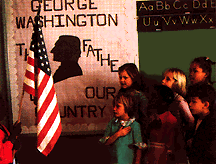[Wesleyan Home Page]
[Wesmaps Home Page]
[Availability Statistics Search]
[Course Description Search]
[Dept. Search]
SOC 263
Education and Inequality
SOC 263 SP
 Photo Caption and Credits
Photo Caption and Credits
Spring 97 Availability (Last Updated on Thu Apr 17 05:00:17 EDT 1997
)
Section Limit Enrollment Available
01 27 0 27
Next Offered in 9798 SP
This course will focus on educational institutions as
mechanisms of cultural transmission, socialization, and
legitimation. How do social characteristics such as
ethnicity, gender, and social class influence classroom
interactions and performance? In what ways are school
experiences related to occupational aspirations and
attainment? We will examine how schools produce inequality
through peer group cultures, tracking, measures of
achievement, and the distribution of knowledge. Schools and
universities often become arenas of cultural and political
conflict; we will assess the possibilities and limits of
educational organizations as vehicles for social change.
MAJOR READINGS
Bowles and Gintis, SCHOOLING IN CAPITALIST AMERICA
Kozol, SAVAGE INEQUALITIES
Nasaw, SCHOOLED TO ORDER
MacLeod, AIN'T NO MAKIN' IT
Oakes, KEEPING TRACK
Persell, PREPARING FOR POWER
Sadker and Sadker, FAILING AT FAIRNESS
Hanson and Tyack, LEARNING TOGETHER
Cookson, SCHOOL CHOICE
Selected Articles
EXAMINATIONS AND ASSIGNMENTS
Three 6-8 page papers, class
participation and research paper.
ADDITIONAL REQUIREMENTS and/or COMMENTS
Unless
preregistered students attend the first class meeting or
communicate directly with the instructor prior to the first
class, they will be dropped from the class list. NOTE:
Students must still submit a completed Drop/Add form to the
Registrar's Office.
COURSE FORMAT: Discussion Lecture
REGISTRATION INFORMATION
Level: UG Credit: 1.00
Gen Ed Area & Dept: SBS SOC
Prerequisites:
SOC 151
Last Updated on MAR-10-1997
About the Photo:
Reference:
Robertson, Ian. SOCIOLOGY, 3rd ed., New York: Worth
Publishers, Inc., 1987
Contact wesmaps@wesleyan.edu to
submit comments or suggestions.
Copyright Wesleyan University, Middletown, Connecticut, 06459
 Photo Caption and Credits
Photo Caption and Credits